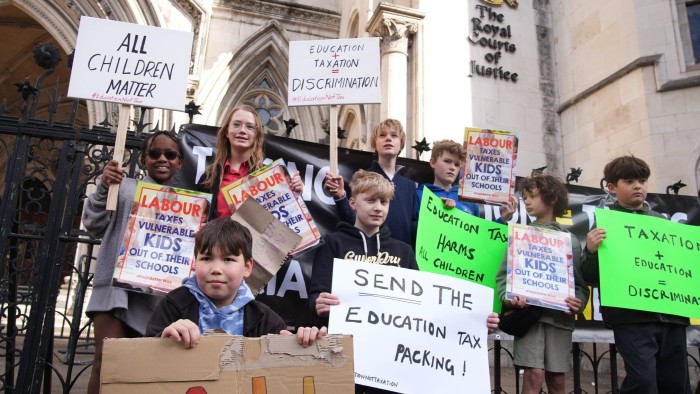Unlock the Editor’s Digest for free
Roula Khalaf, Editor of the FT, selects her favourite stories in this weekly newsletter.
UK ministers were warned by civil servants that imposing VAT on private schools fees from January was the “most disruptive” option for pupils, court documents show.
Treasury files reveal that chancellor Rachel Reeves dismissed the idea of introducing the 20 per cent levy in April or August 2025 in order to “maximise revenue”.
The internal communications between Treasury officials and the chancellor shine a light on government deliberations last July, in the weeks between Labour winning the general election and rolling out the policy.
The correspondence was obtained through the High Court as part of a legal challenge against the government over its 20 per cent tax on the private schools sector.
Officials discussed a series of risks associated with the VAT policy, including school closures, displacement to the state sector and school pre-payment schemes.
According to court documents seen by the Financial Times, Reeves was presented with a “pros” and “cons” table showing different start dates and the impact each would have on the sector.
In the briefing note sent on July 6, a start date of January 2025 is listed as the “most disruptive” scenario and “August/September 2025” as the “least disruptive”.
Officials told the chancellor the Department for Education itself has “noted it may be less disruptive for schools and parents” if the changes took effect from August 2025.
However, an internal email sent between Treasury officials on July 15 revealed James Murray, the exchequer secretary to the Treasury, wanted to “put the two options of a January 2025 and an April 2025 start date” to Reeves to make a final decision.
“Noting the trade-offs between revenue maximisation (January) and giving schools time to prepare (April),” it added.
The government would go on to make fees paid from July 29, 2024, subject to VAT at the standard rate, as it sought to prevent schools offering pre-payment to parents seeking to avoid the tax after it was formally applied in January 2025.
The documents show Reeves was warned that preventing parents from paying private schools fees in advance to avoid VAT was a “retrospective” move that could result in litigation.
In the run-up to the July election, some private schools offered parents the opportunity to pay fees for multiple years in advance in an attempt to circumvent the tax if Labour won at the polls.
A crackdown on prepayments from when the announcement was made onwards “could be controversial given the legislation has retrospective effect”, officials wrote in the July 15 internal email.
“But we believe it is defensible given widespread coverage of attempts to circumvent the changes and to ensure consistent treatment for parents,” they added.
Reeves was also told to expect that capturing these prepayments would lead to “some litigation between HMRC and affected schools” as well as “disputes between schools and parents over who ultimately bears a potentially unexpected VAT liability”.
Officials discussed whether the pre-payment could be implemented even earlier but Reeves was advised it would be “much more difficult to justify”.
The court documents show officials estimated the cost of exempting independent pupils with special education needs, who are not on an Education, Health and Care Plan, from the VAT charge would be about £450mn per year, which one said he viewed as “unaffordable”.
Their analysis also suggested that about 100 additional independent schools may close over the next three years “directly” as a result of the VAT charge.
Officials noted that while between 60 and 80 independent schools may close a year regardless of the levy, it would “exacerbate the financial situation of schools, particularly smaller schools”.
They estimated that about 54,000 pupils would be moved into the state sector across the UK, “most within two years”.
A Treasury spokesperson said: “We do not comment on litigation matters.”




